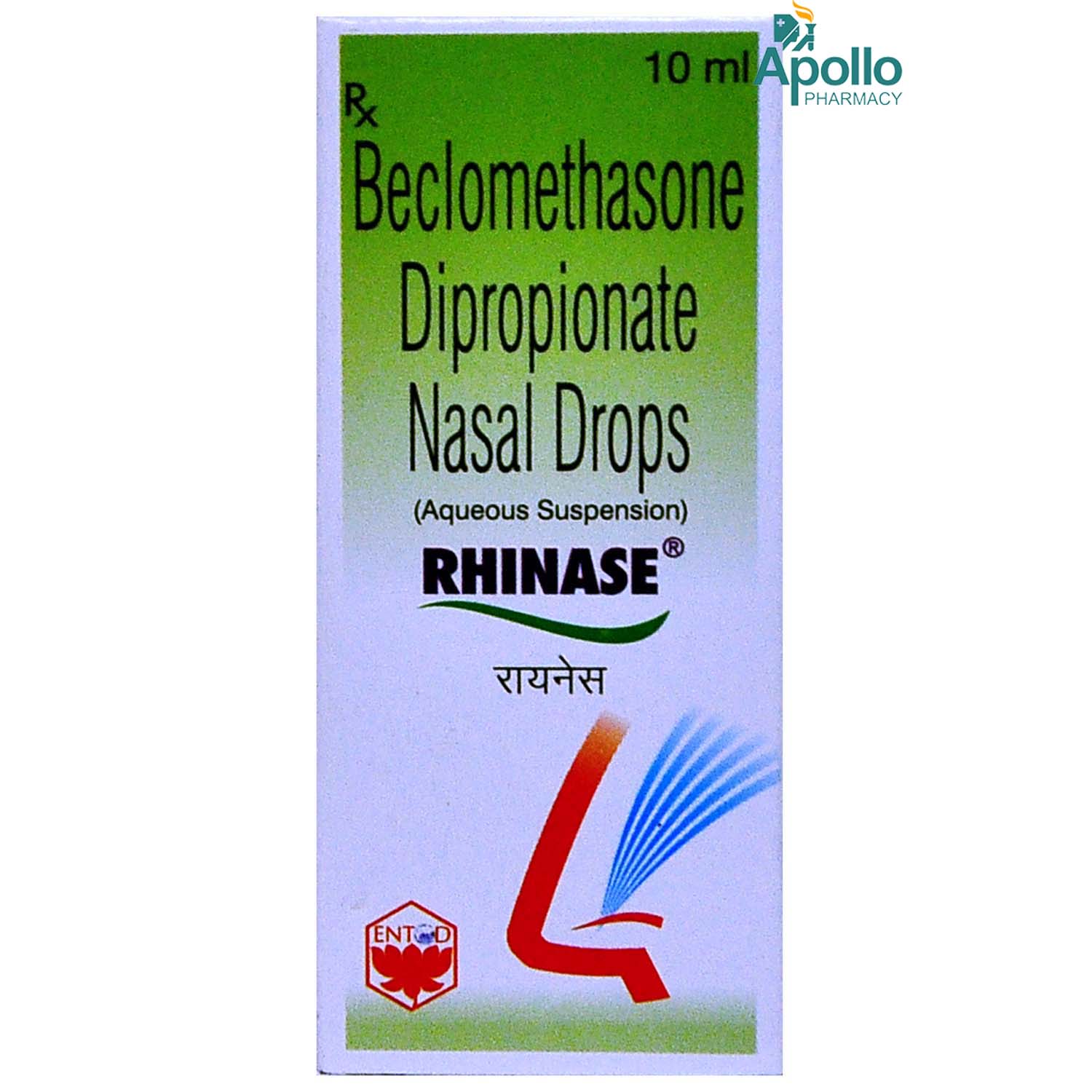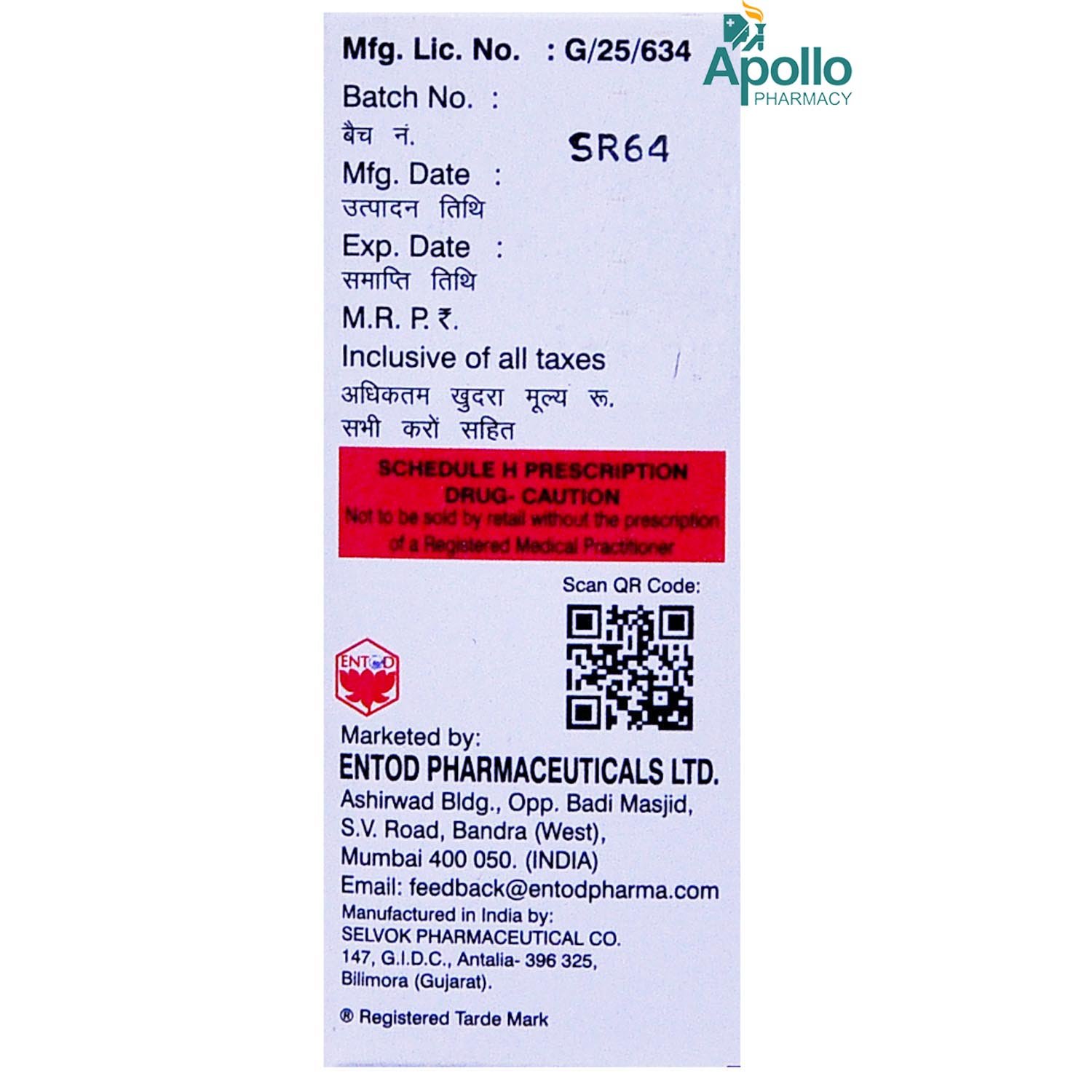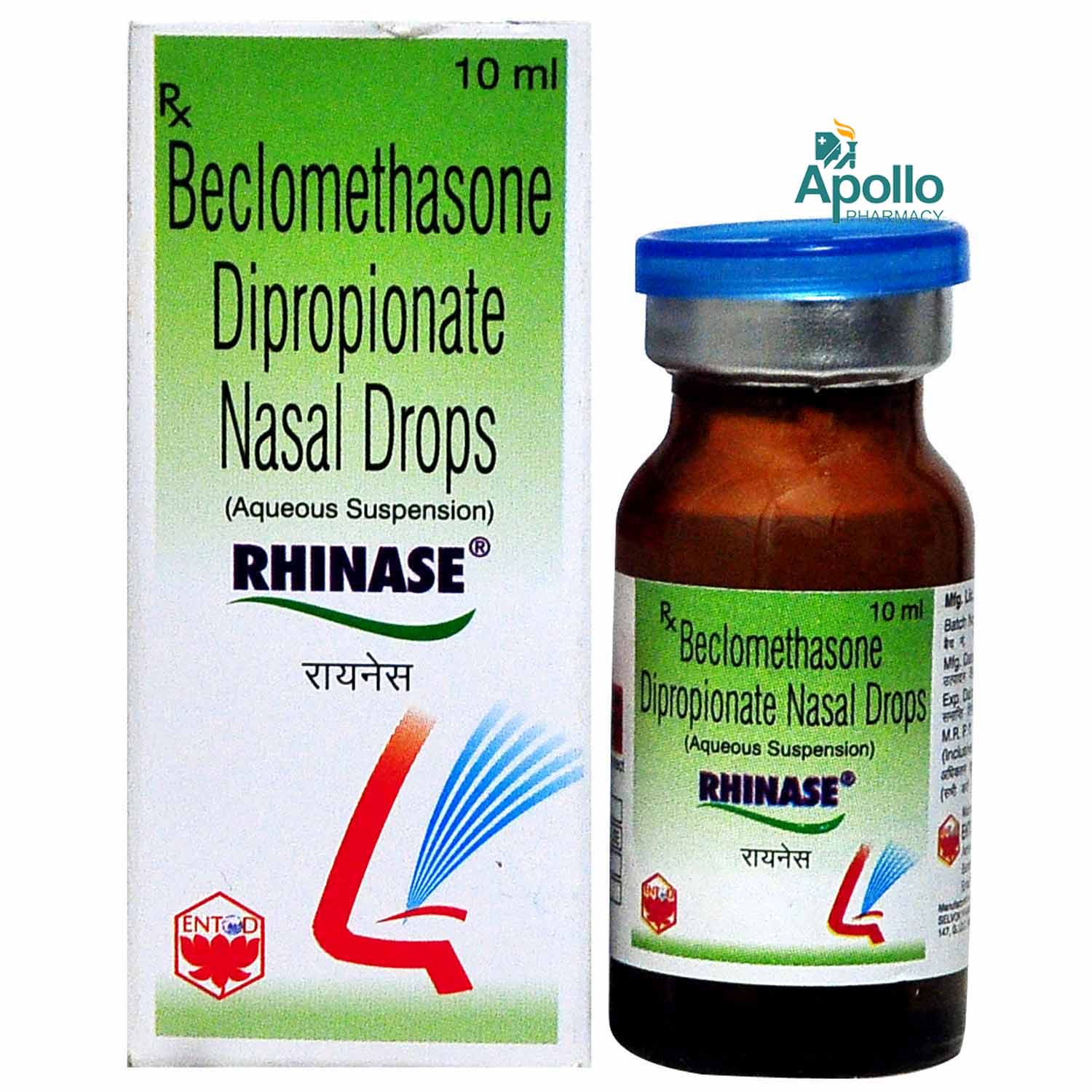Rhinase Nasal Drops 10 ml
MRP ₹165
(Inclusive of all Taxes)
₹24.8 Cashback (15%)
Know Your Delivery Time
Provide Delivery Location

Secure Payment

India's Most Trusted Pharmacy

Genuine Products
Composition :
Manufacturer/Marketer :
Consume Type :
Return Policy :
Expires on or after :
About Rhinase Nasal Drops
Rhinase Nasal Drops belongs to a class of corticosteroid medications used to relieve symptoms of allergic rhinitis/hay fever, allergies, and vasomotor (nonallergic) rhinitis. It is also used to minimize nasal polyps (non-cancerous growths on the lining of the nose or sinuses) during nasal polyp removal surgery. Allergic rhinitis is an allergy-induced by dust or pollen that causes inflammation of the mucous membranes of the eyes and nose, resulting in a runny nose and watery eyes.
Rhinase Nasal Drops contains Beclomethasone Dipropionate, a corticosteroid that works by blocking the action of natural chemical substances which cause allergic reactions. Thus, it relieves the symptoms of itchy, stuffy or runny nose, sneezing, or other associated symptoms due to hay fever, other allergies, or vasomotor (nonallergic) rhinitis.
Rhinase Nasal Drops must be used as directed by the healthcare professional or as per leaflet information. Rhinase Nasal Drops may cause side effects such as sneezing, dry or sore throat, unpleasant taste or smell and dry or sore nose or nosebleeds. These side effects vary individually and may not occur in everyone taking Rhinase Nasal Drops. If any of the side effects are not manageable, consult your doctor.
Inform your doctor before using Rhinase Nasal Drops if you have ever had an allergic reaction to any of the components in Rhinase Nasal Drops, have an infection in your nose, have had nose surgery, or have recently taken other corticosteroid medicines. Consult your doctor if you are trying to get pregnant, are already pregnant, or are breastfeeding. Rhinase Nasal Drops is not recommended for children under the age of six.
Uses of Rhinase Nasal Drops
Rhinase Nasal Drops is used to manage and prevent various nasal conditions caused by allergies and inflammation. The detailed uses of Rhinase Nasal Drops are as follows:
- Allergic rhinitis symptoms: Rhinase Nasal Drops reduces sneezing, nasal congestion, runny nose, and itching due to hay fever and other allergies.
- Perennial nonallergic rhinitis: Rhinase Nasal Drops provides relief from chronic nasal inflammation not related to allergens.
- Vasomotor rhinitis: Rhinase Nasal Drops treats nasal symptoms triggered by environmental factors like cold air or strong odors.
- Prevention of nasal polyps recurrence: Rhinase Nasal Drops is used after nasal polyp removal surgery to reduce the possibility of regrowth.
- Reduction of nasal inflammation: Rhinase Nasal Drops reduces swelling and irritation inside the nose, enhancing airflow and comfort.

Have a query?
Directions for Use
- It is advised to use Rhinase Nasal Drops twice daily; however, follow your doctor's recommendation regarding the dosage and duration.
- Insert the tip of the bottle into a nostril while closing the other nostril and spray towards the sides of the nostril. Keep your head straight and breathe gently. Repeat the same process for the other nostril if required.
- Gently blow your nose to clear the nostrils before using Rhinase Nasal Drops.
- Wipe the applicator with a clean tissue and close the cap.
Medicinal Benefits
Rhinase Nasal Drops belongs to a class of corticosteroid medications. Rhinase Nasal Drops contains Beclomethasone dipropionate, a corticosteroid that works by blocking the action of natural chemical substances which cause allergic reactions. It relieves the symptoms of itchy or runny nose, sneezing, or other associated symptoms due to allergies, hay fever, or vasomotor (nonallergic) rhinitis. Rhinase Nasal Drops is also used to minimise nasal polyps (non-cancerous growths on the lining of the nose or sinuses) during nasal polyp removal surgery.
How Rhinase Nasal Drops Works
Storage
What if I have taken an overdose of Rhinase Nasal Drops
Drug Warnings
Inform your doctor if you are allergic to any of the contents in Rhinase Nasal Drops, have an infection in the nose, have had nose surgery, or have recently taken other corticosteroid medicines. Consult your doctor if you are pregnant or breastfeeding. Rhinase Nasal Drops is not recommended for children under the age of six. Your doctor will decide the appropriate dose for children above 6 years.
Drug-Drug Interactions
Drug-Drug Interactions
Login/Sign Up
Co-administration of Desmopressin together with Beclomethasone may increase the risk of hyponatremia (low levels of salt in the blood).
How to manage the interaction:
If you have to use Desmopressin and Beclomethasone together, your doctor may adjust the dose or monitor you more frequently to safely use both medications. However, if you experience loss of appetite, headache, nausea, vomiting, lethargy (very tired), irritability, difficulty concentrating, weakness, unsteadiness, memory impairment, confusion, muscle spasm, decreased urination, and/or sudden weight gain, contact your doctor immediately as these may be symptoms of water intoxication (water poisoning) and hyponatremia (low levels of salt in the blood). Do not discontinue the medication without consulting a doctor.
Co-administration of Beclomethasone dipropionate with Mifepristone may make it less effective as a therapy.
How to manage the interaction:
Taking Beclomethasone with Mifepristone is not recommended, but it can be taken if prescribed by the doctor. Do not discontinue any medication without consulting a doctor.
Taking Pimecrolimus with Beclomethasone can increase the risk of side effects.
How to manage the interaction:
Although taking Beclomethasone and Pimecrolimus together can cause an interaction, it can be taken if a doctor has suggested it. However, if you experience any unusual symptoms, consult the doctor. Do not stop using any medications without talking to a doctor.
Drug-Food Interactions
Drug-Food Interactions
Login/Sign Up
Diet & Lifestyle Advise
- Keep your hygiene in check and your surroundings neat.
- Include ginger in your daily intake. Some anti-inflammatory chemicals in ginger help relax airway membranes.
- Stay hydrated. Coughing, runny nose, and sneezing can be relieved by drinking beverages at room temperature.
- Stress weakens the immune system and increases the likelihood of being ill. Exercise regularly, meditate, practise deep breathing, and try progressive muscle relaxation techniques to relieve stress.
- Rest well. Get optimum sleep.
- It is best to avoid contact with recognised allergens (allergy-causing agents) such as pollen, dust, etc.
- Avoid certain food that is known to trigger allergies in you.
- Processed foods and those high in sugar and fat should be avoided because they may trigger inflammation.
- Reduce your daily salt intake and replace it with herbs or spices such as garlic, ginger, and turmeric, which contain natural anti-inflammatory ingredients.
Habit Forming
Therapeutic Class
All Substitutes & Brand Comparisons
Alcohol
Caution
It is not known if alcohol interacts with Rhinase Nasal Drops. Please consult your doctor if you have any concerns.
Pregnancy
Caution
Please consult the doctor. There are no adequate and well-controlled studies on pregnant women. Your doctor will prescribe only if the benefits outweigh the risks.
Breast Feeding
Caution
Consult your doctor as there is no substantial research yet on the use of Rhinase Nasal Drops in breastfeeding/nursing mothers.
Driving
Safe if prescribed
Rhinase Nasal Drops does not impact your ability to drive or operate machinery.
Liver
Caution
If you have any concerns regarding the usage of Rhinase Nasal Drops in people with liver problems, please consult your doctor.
Kidney
Caution
If you have any concerns regarding the usage of Rhinase Nasal Drops in people with kidney problems, please consult your doctor.
Children
Caution
Rhinase Nasal Drops is not recommended for children below 6years.
Heart
Inform your doctor if you have a history of heart disease. Your doctor will prescribe only if the benefits outweigh the risks.
Geriatrics
Consult your doctor
Limited information available about the use of Rhinase Nasal Drops in geriatric patients. Please consult your physician.
FAQs
Country of origin
Manufacturer/Marketer address
Disclaimer
Author Details
We provide you with authentic, trustworthy and relevant information








